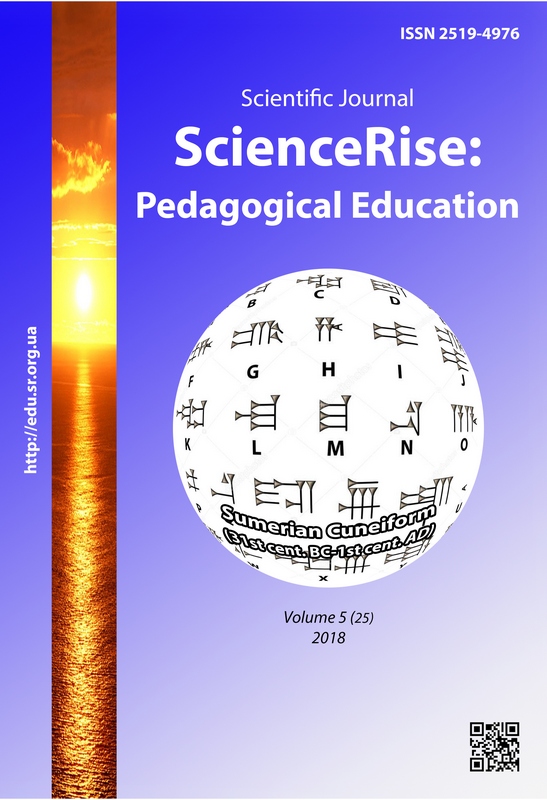Еразмус + координатор як тьютор та ментор в умовах зростання академічної мобільності у ЗВО України
DOI:
https://doi.org/10.15587/2519-4984.2018.134545Ключові слова:
Еразмус, тьютор, ментор, академічна мобільність, реформування вищої освіти, інтернаціоналізація, рейтинговістьАнотація
У статті виконано аналіз сучасного стану вищої освіти України, реалізації академічної мобільності, розкрито особливості впровадження тьюторингу та менторингу в українських реаліях. Здійснено порівняльний аналіз забезпечення тьюторської і менторської діяльності в Україні та ЗВО Європи і світу. Виокремлено функції, які виконують Еразмус + координатори для забезпечення тьюторської і менторської діяльності в Україні. Зокрема була обґрунтована необхідність впровадження тьюторингу та менторингу в українських ЗВО. Ключовими чинниками, які впливають на необхідність впровадження тьюторингу та менторингу є інтернаціоналізація, зростання академічної мобільності, проблеми з біженцями, нові виклики у вищій освіті та нові вимоги до забезпечення якості освіти. Програма Еразмус + на сьогодні являється наймасштабнішим інструментом реалізації академічної мобільності в Європі. Саме тому, наявність тьюторів та менторів допомагає студентам, які навчаються протягом одного семестру (кредитна мобільність), або магістратури (ступенева мобільність), реалізувати свій потенціал та успішно закінчити навчання в партнерському ЗВО. Під час навчання студенти, які реалізовують академічну мобільність, отримують допомогу від тьюторів при вирішенні практичних завдань, лабораторних робіт. Ментори допомагають адаптуватися до умов проживання, традицій іншої країни, мови. Лише комплексне наставництво забезпечує гармонійний розвиток та успішність студента, реалізовуючи принципи студентоцентрованого навчання. Ситуація щодо імплементації тьюторства та менторства відрізняється в залежності від країни. Успішність університету сьогодні також залежить від реалізації академічної мобільності і бажання іноземних студентів навчатися в тому чи іншому ЗВО. В даній статті були виокремлені основні функції, які реалізовуються Еразмус + координаторами для забезпечення тьюторської та менторської діяльності: інформаційна (повідомлення про можливості обміну, надання необхідної інформації), комунікативна ( налагодження діалогу з усіма учасниками мобільності), організаційна (підготовка необхідної документації), виховна (наставництво щодо поведінки закордоном), психологічна (визначення психологічних рис кожної особи та індивідуальних особливостей для забезпечення комфортних умов перебування закордоном). Стаття обґрунтовує можливість впровадження тьюторства та менторства у ЗВО України на основі досвіду закордонних ЗВО
Посилання
- Мorhunova, N. S. (2016). Psykholohichnyi aspect tiutorskoyi ta kuratorskoyi diyalnosti u procesi roboty z inozemnymy studentamy u VNZ Ukrayiny [Psychological aspect of the tutoring and curator activity in the process of work with foreign students at HEIs of Ukraine]. Pedahohika ta psykholohiya, 53, 330–339.
- Nastenko, L. H. (2010). Tiutorstvo yak prohresyvna tekhnolohiya indyvidualizaciyi osvity u vyschiy shkoli [Tutoring as progressive technology of education individualization at higher school]. Humanitarna osvita v tekhnichnykh vyschykh navchalnykh zakladakh, 21, 259–269.
- Мaliarchuk, О. V. (2009). Vykladach v systemi dystanciynoho navchannia [Teacher in the system of distance learning]. Pedahohichnyi proces: teoriya i praktyka, 2, 169–178.
- Hempel, A., Seidl, T., van Genuchten, E. (2016). Erhebung des Einsatzes von Tutorinnen und Tutoren als Grundlage für zielgerichtete Organisationsentwicklung. Die hochschullehre Interdisziplinäre Zeitschrift für Studium und Lehre, 1. Available at: http://www.hochschullehre.org/wp-content/files/diehochschullehre-2016-1-Hempel-Seidl-vanGnuchten.pdf
- Knauf, H. (2005). Tutorenhandbuch. Einführung in die Tutorenarbeit. Bielefeld: Universitätsverlag. Available at: https://www.zvab.com/9783937026343/Tutorenhandbuch-Einf%C3%BChrung-Tutorenarbeit-Livre-allemand-3937026347/plp
- Bland, C. J., Taylor, A. L., Shollen, S. L., Weber-Main, A. M., Mulcahy, P. A. (2009). Faculty success through mentoring: A guide for mentors, mentees, and leaders. Lanham: R&L Education, 228.
- VanLehn, K. (2006). The Behavior of Tutoring Systems. International Journal of Artificial Intelligence in Education, 16 (3), 227–265.
- Rashkevych, Yu. М. (2014). Bolonskyi proces ta nova paradyhma vyschoyi osvity [Bologna process and new paradigm of higher education]. Lviv: Vydavnyctvo Lvivskoyi Politekhniky, 168.
- Semenenko, І. Ye. (2013). Tekhnolohiya pedahohichnoho suprovodu u procesi fakhovoyi pidhotovky inozemnykh studentiv v umovakh vyschoho tekhnichnoho navchalnoho zakladu [Technology of pedagogical support in the process of professional training of foreign students in the conditions of higher technical educational establishment]. Pedahohika ta psykholohiya, 44, 111–117. Available at: http://nbuv.gov.ua/UJRN/znpkhnpu_ped_2013_44_14.
- Мukan, N. V., Мukan, О. V., Іstomina, K. Yu. (2014). Determinuvannia ta osoblyvosti rozvytku neperervnoyi pedahohichnoyi osvity na pochatku ХХІ stolittia u suchasnomu osvitniomu prostori [Determination and peculiarities of the development of continuing pedagogical education at the beginning of XXI century in the modern educational space]. Porivnialno-pedahohichni studiyi, 1 (19), 100–105.
##submission.downloads##
Опубліковано
Як цитувати
Номер
Розділ
Ліцензія
Авторське право (c) 2018 Oksana Ivanytska

Ця робота ліцензується відповідно до Creative Commons Attribution 4.0 International License.
Наше видання використовує положення про авторські права Creative Commons CC BY для журналів відкритого доступу.
Автори, які публікуються у цьому журналі, погоджуються з наступними умовами:
1. Автори залишають за собою право на авторство своєї роботи та передають журналу право першої публікації цієї роботи на умовах ліцензії Creative Commons CC BY, котра дозволяє іншим особам вільно розповсюджувати опубліковану роботу з обов'язковим посиланням на авторів оригінальної роботи та першу публікацію роботи у цьому журналі.
2. Автори мають право укладати самостійні додаткові угоди щодо неексклюзивного розповсюдження роботи у тому вигляді, в якому вона була опублікована цим журналом (наприклад, розміщувати роботу в електронному сховищі установи або публікувати у складі монографії), за умови збереження посилання на першу публікацію роботи у цьому журналі.









